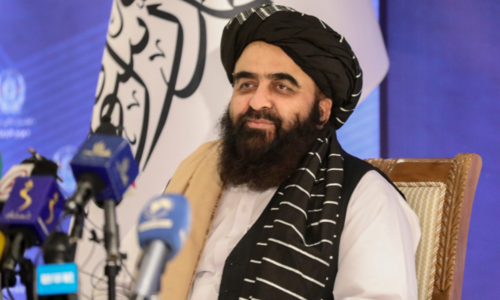THERE’s a line from The Leopard, Italy’s most beloved novel of all time: “If we want everything to stay as it is, everything has to change.”
Maybe that’s why, when it came to this past week, it all felt like the old days in Naya Pakistan: judges hauling in the prime minister, talks with terrorists, soaring prices, and chatter about the postings of lieutenant generals — the kind of buzz so common to parliamentary democracies.
Some developments were dire. First, Khadim Rizvi’s kids were given a big hug, let out of jail, and handed back their party. Even Mufti Muneeb, former federal minister for stargazing, put away the telescopes to turn hostage negotiator. The TLP was un-banned in ‘the larger national interest’.
Meanwhile, talks with the TTP’s insurgents carried on, and even climaxed with a ceasefire; the PTI government said it was aiming for ‘complete peace’.
‘Talks’ imply parity; the TTP should be asked to surrender.
To be sure, militants aren’t new to Pakistan. But between embracing one and evading the other, plenty has gone wrong. Per last week’s autopsies, the end-reason is ‘the state’ in all its variants: weak, deep, or dependent.
After a while though, such excuses numb the mind. As bad as its problems are, the state has also demonstrated it can solve them when the will strikes. If the past several years are any indicator, this country made a miraculous comeback from Covid-19, fended off a massive insurgency, restored federalism, ended FCR, is en route to an unprecedented third democratic transition, and has deterred a far larger rival, currently in the grips of saffron lunacy, from bombing more of its trees.
To keep surrendering to the same extortion artists — again and again and again — doesn’t speak of the weakness of the ruling class. It speaks of complicity.
We’ll turn to the TLP first. Though he’d seen this movie already with Mr Bhutto in 1977 and Mian Sahib in 1998, Mr Khan thought he’d become the first man in Pakistan’s history to outflank the religious right. There came the Rehmatulil Alameen authority and the Barelvi messaging.
None of it worked; the TLP ended up legal again. Though our policemen had already been murdered, the justification given was that violence had been averted; that taking action would have led to bloodshed, a Lal Masjid even.
Read more: PM allowed force use, but military opposed it
But it’s these exact sorts of extremes that muddy the waters so much: that on the infinite spectrum of options a state like Pakistan has, the only choice is between slaughter and surrender.
It’s also a false binary: just a few months ago, the TLP’s head agitators were in jail, the centre had vowed to dissolve the party via a reference to the Supreme Court, and everyone was trying to move on. For this country’s sake, the state can either grab back that courage, or await coalitions with the younger Rizvi, same as the old Rizvi, in 2023.
Now to the bigger brutes. The most obvious problem with the TTP is the one that hits the heart: that they have killed so many of our own. Take emotion out of the equation, however, and it still makes no sense. This contributor has already written in these pages how — regardless of whether it was our war or not — the insurgency was always headed Pakistan’s way; how the TTP violated each agreement; and how it is, at its essence, a criminal racket that only buys time to gain space.
Read more: Pakistan doesn't want a hostile govt in Kabul, but pardoning the TTP is not a good idea
Right from his opposition days, however, Mr Khan has blurred together the Afghan Taliban with the TTP, and with reason: it’s far easier to skip around a shapeless monolith that also happens to be fighting an occupation next door, than to come to grips with the fact that a distinct offshoot is butchering one’s own countrymen.
The dialogue camp nonetheless persists: this is a black swan event, they say; the TTP is on its last legs, the Afghan Taliban are ushering talks along, and the sands are shifting. If such is the case — and it likely isn’t — then the state could at least take a far harder line. ‘Talks’ imply parity; the TTP should be asked to surrender or surrender, with no forgiveness for leaders or spokespersons. As each ceasefire has proven already, it’s the only tone they understand.
That will most needs to be demonstrated in the APS Peshawar case: per this paper of record, “The parents had demanded the registration of a first information report … against those civilian and military officials who, they believe, were responsible for security measures....” No action was taken, hence the PM’s summons by the Supreme Court.
It bears saying the obvious that there can be no healing from this long war until the parents’ questions are answered: that heads must roll, that the full inquiry report be released, and that this never happen again.
Read more: What Pakistan can learn from global examples of deals with militant groups
Having come so far, this country cannot be allowed to turn around and go backwards. APS Peshawar changed Pakistan. But it must stay changed.
The writer is a barrister.
Published in Dawn, November 15th, 2021














































